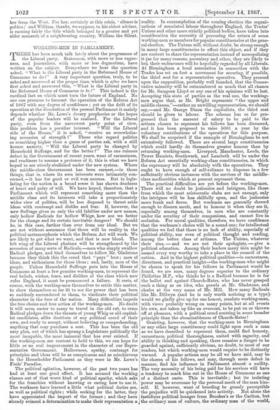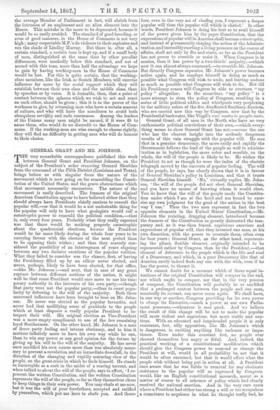WORKING-MEN IN PARLTAMFINT. T HERE has been much talk lately about
the programme of the Liberal party. Statesmen, with more or less vague- ness, and journalists, with more or less dogmatism, have written on the subject. Everywhere we hear the question asked, " What is the Liberal party in the Reformed House of Commons to do ?" A very important question, truly, to be asked and answered at the proper time, which is after we have first asked and answered this, " What is the Liberal party in the Reformed House of Commons to be ?" This indeed is the cardinal fact on which must turn the future of England. No one can presume to forecast the operation of the Reform Act of 1867 with any degree of confidence ; yet on the drift of its operation at the dissolution of the present Parliament it mainly depends whether Mr. Lowe's dreary prophecies or the hopes of the popular leaders will be realized. For the Liberal party, even from the narrowest party point of view, this problem has a peculiar interest. " Will the Liberal' side of the House," it is asked, "receive an overwhelm- ing accession of strength I" Those who regard politics as something higher than a game of parties ask, with a still keener anxiety, " Will the Liberal party be changed by Household Suffrage, and for the better ?" The one ruinous defect in the Government of recent years, want of earnestness, and readiness to assume a pretence of it, this is what we have hoped to see utterly abolished under the new system. Where the middle-class. Government has been earnest,—in those things, that is, where its own interests were intimately con- cerned, —it has for good or evil won success. But in legis- lating for the nation in a broad sense it has shown deadness of heart and palsy of will. We have hoped, therefore, that a Parliament which will represent something more than the middle class and its interests will take a proportionately wider view of politics, will be less disposed to thrust aside ideas with contempt and dislike and fear. If, however, the new Suffrage gives us only the old falsities under new names, only hollow Radicals for hollow Whigs, how are we better for the change and its certain inevitable dangers? We should be, in this case, farther than ever from our ideal. But we are not without assurance that there will be reality in the political metamorphosis which the Reform Act will work. We are likely to get what we want, and that is new blood. The left wing of the Liberal phalanx will be strengthened by the accession of many sorts of Radicals,—men who simply swallow Radical pledges, and bind themselves to follow Mr. Gladstone because they think this the creed that "pays " best ; men of ideas, and enthusiasm for those ideas ; and, lastly, men of the people. Unless Household Suffrage puts into the House of Commons at least a few genuine working-men, to represent the real beliefs, wishes, fears, and dislikes of the class which now rules England, it must be pronounced a failure. It rests, of course, with the working-men themselves to settle this matter, to show themselves so far fit to use the power that has been so suddenly surrendered to them, to vindicate their political character in the face of the nation. Many difficulties impede the free choice and free action of the working-men. No doubt it will seem easier to many to travel in the old rut, to cram Radical pledges down the throats of young Whig or old capital- ist candidates, alike destitute of any political creed of their own, and ready to accept, without believing or comprehending, anything that may purchase a seat. This has been the old easy plan, out of which has sprung a Legislature politically the most incapable, the most immoral that has ever existed. If the working-men are content to hold to this, we can hope for little or no real improvement in the character of our Repre- sentative Government. Hollowness, apathy, contempt for principles and ideas will be as conspicuous and as mischievous in the Householder Parliament as they were in Mr. Lowe's Fools' Paradise.
The political agitation, however, of the past two years has had at least one good effect. It has aroused the working classes out of that worst kind of political apathy, which asks for the franchise without knowing or caring how to use it. The workmen have learned a little what political duties are, as well as political rights ; while seeking for the latter, they have appreciated the import of the former ; and they have already evinced a determination to make their representation a reality. In contemplation of the coming election the organi- zations of associated labour throughout England, the Trades' Unions and other more strictly political bodies, have taken into consideration the necessity of procuring the return of some working-men as members for popular constituencies at the gene- ral election. The Unions will, without doubt, be strong enough in many large constituencies to effect this object, and if they are content to share the representation instead of monopolizing- it (as for many reasons, pecuniary and other, they are likely to be), their endeavours will be hopefully regarded by all Liberals.. At Birmingham a local association in connection with the- Trades has set on foot a movement for securing, if possible, the third seat for a representative operative. They proceed upon the supposition, probably well founded, that the Conser- vative minority will be outnumbered so much that all chance• for Mr. Sampson Lloyd or any one of his opinions will be lost. Accepting this state of parties as the real one, the working- men argue that, as Mr. Bright represents " the upper and middle classes,"—rather an unwilling representation, we should' say,—and Mr. George Dixon the capitalists, the third seat should be given to labour. The scheme has so far pro- gressed that the amount of salary to be paid to the- artizan chosen to represent his fellows has been discussed, and it has been proposed to raise 5001. a year by the- voluntary contributions of the operatives for this purpose. We shall be surprised if the example of Birmingham be not extensively followed. There are several large constituencies. which could hardly do themselves greater honour than by returning working-men. Liverpool, Manchester, Leeds, the- Tower Hamlets, Southwark, and Lambeth will be under the Reform Act essentially working-class constituencies, in which the supremacy will be absolutely with the operatives. They ought to have enough of self-reliance to dispense in a few sufficiently obvious instances with the services of the middle- class mediocrities which at present represent them.
The practical difficulties are yet before the working-men. There will no doubt be jealousies and intrigues, like those- from which the most aristocratic clubs are not exempt, only the intrigues will be less skilfully spun, and the jealousies- more frank and fierce. But workmen are generally Shrewd enough to discern merit, and to honour it when they see it, especially among themselves, in men who are constantly under the scrutiny of their companions, and cannot live in seclusion. For moral qualities, therefore, we have confidence- that the workmen's choice will be a sound one; for intellectual qualities we feel that there is no lack of ability, especially of" political ability, nor even of political thought and reading, among the better class of artizans. The Unions, whatever their sins, — and we are not their apolpgists, — give a. political education. Among their leaders many men might be- named every way worthy to take a place in the council of the- nation. And in the highest political qualities—in earnestness, directness, and practical insight—the working-man who might be chosen to speak for his fellows in Parliament would be- found, we are sure, many degrees superior to the ordinary Philistine M.P., who thinks he is a Radical because he is for the ballot and against Church-Rates, who has never grasped such a thing as an idea, who growls at Mr. Gladstone, and chafes at the very name of Mr. Mill. How many Radicals-. like Mr. Dillwyn (and he is only worth noticing as a type} would we gladly give up for one honest, resolute working-man, with views probably wrong on many points, but at all events• his own, not taken up like an overcoat, to be put on or thrown off at pleasure, with a political creed centring in some broader- principle than the abominableness of Church-Rates ! Granting, however, that the working-men in Birmingham or any other large constituency could light upon such a man. as we have described to represent them, could find honesty, earnestness, political thoroughness, united with sagacity, and ability in thinking and speaking, there remains a danger to be guarded against, sufficiently obvious, no doubt, to most of our- readers, but which working-men would require to be distinctly warned. A popular artisan may be all we have said, may ba- the chosen of his fellows, and may, through mere defect in manner, find his influence in Parliament almost a nullity. The very necessity of his being paid for his services will have a tendency to mark him out in the House of Commons as one of a distinct caste. This is inevitable ; but its isolating- power may be overcome by the personal merit of the man him- self. If, however, want of breeding be grossly perceptible the prejudice will be quickened into activity. Not alone the- fastidious political lounger from Brookes's or the Carlton, but the ordinary man of culture, the ordinary man of the world,. the average Member of Parliament in fact, will shrink from the intrusion of an unpleasant and an alien element into the House. This mistake is the more to be deprecated, because it would be so easily avoided. The standard of good breeding, or even of good manners, in the House of Commons is not very high ; many respectable M.P.'s do violence to their aspirates and vex the shade of Lindley Murray. But there is, after all, a certain standard, a certain tone is kept up, and if a small body of men, distinguished at the same time by other peculiar differences, were markedly below this standard, and out of accord with this tone, more than half the advantage we hope to gain by having working-men in the House of Commons would be lost. For this is quite certain, that the working- class members, like the Irish or Scotch Members, will exercise influence far more by the social rapport which they will establish between their own class and the middle class, than by speeches or by votes. It is desirable, then, that a point of contact between the spheres which we wish to act and react on each other, should be given ; this it is in the power of the workmen to give, by returning men who have a certain amount of culture, and who will have the manliness to avoid both obsequious servijity and rude coarseness. Among the leaders of the Unions many men might be named, if it were fit to name them, who would do no discredit to the House of Com- mons. If the working-men are wise enough to choose rightly, they will find no, difficulty in getting men who will do honour to their choice.































 Previous page
Previous page